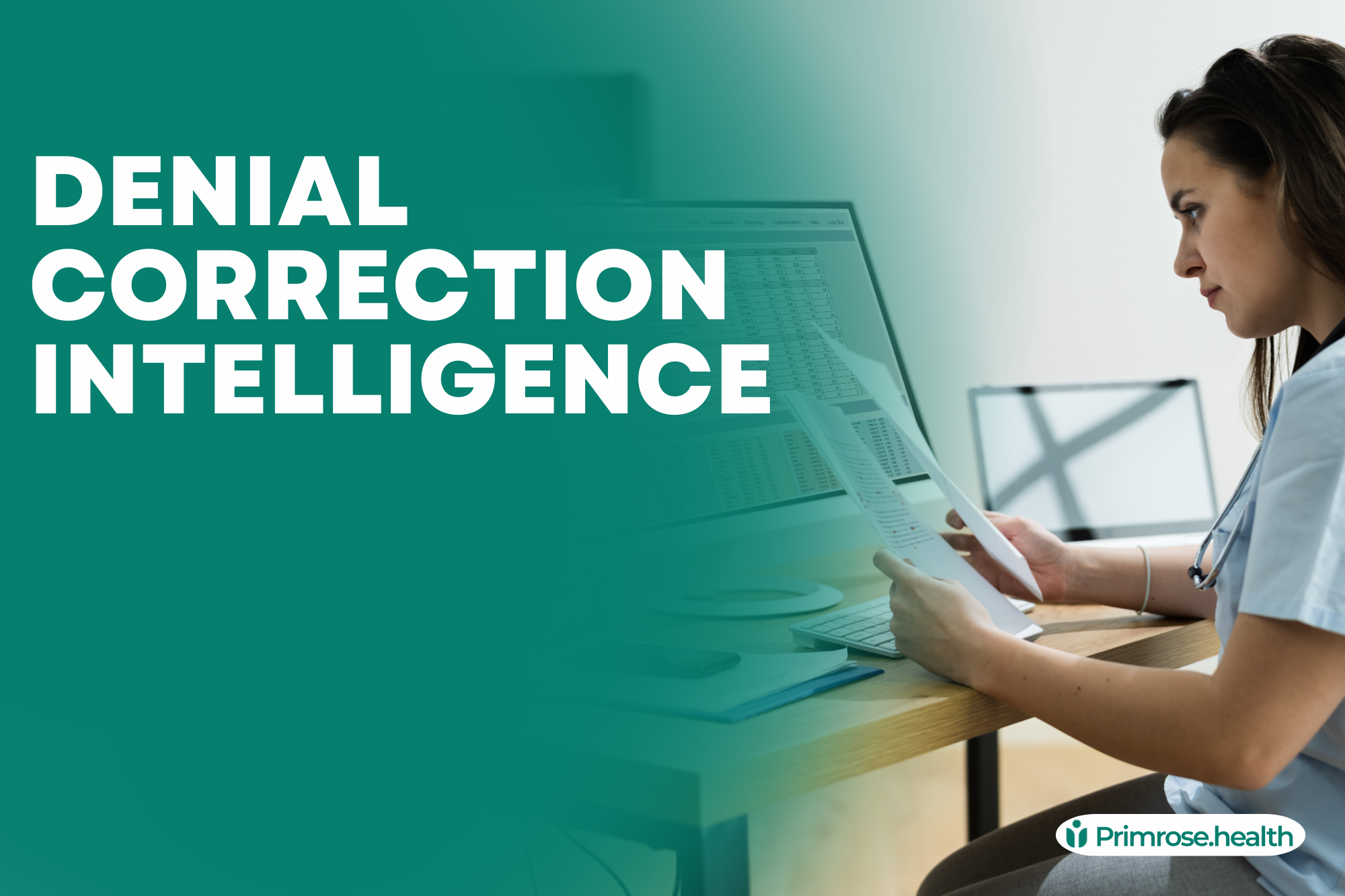Introduction
Denied claims cost healthcare organizations more than delayed payments. They lead to manual work, cash flow issues, and lost revenue. Reworking a denied claim costs around $118 to $125. Yet, 50–65% of these claims are never recovered. The financial hit is huge.
Traditional denial management tries to make rework faster. But there’s a better way. What if you could find the real causes of denials and fix them automatically with high accuracy? That’s what Denial Correction Intelligence offers. It’s a new AI method from Primrose.health. This tool is changing how organizations recover denied revenue.
Beyond Traditional Denial Management
For decades, healthcare organizations have approached denials through a linear, reactive process: receive denial, identify cause, correct error, resubmit claim, and hope for better results. This approach suffers from several critical limitations:
- Delayed intervention: Problems are only discovered after claims are denied, typically 2-4 weeks post-submission
- Limited pattern recognition: Human analysts can’t easily detect subtle patterns across thousands of denials
- Reactive focus: Resources are devoted to fixing problems rather than preventing them
- Institutional knowledge dependency: Success depends heavily on individual staff expertise
- Static approaches: Strategies don’t automatically adapt to changing payer behaviors
The Intelligence Revolution in Denial Management
Denial Correction Intelligence represents a paradigm shift in addressing this challenge. Rather than simply making the denial management process more efficient, this approach applies advanced analytics and artificial intelligence to understand root causes, automate corrections, and create preventive feedback loops.
The core components of this approach include:
1. Root Cause Analysis Through AI
Traditional denial management focuses on the stated reason for denial (e.g., “medical necessity not established”). Denial Correction Intelligence goes deeper:
- Analyzing clinical documentation patterns associated with denials
- Identifying provider-specific documentation tendencies that trigger reviews
- Recognizing payer-specific language preferences and requirements
- Detecting subtle combinations of factors that lead to denials
- Distinguishing between symptom (denial code) and underlying cause
2. Automated Correction Generation
Beyond identifying problems, Denial Correction Intelligence generates precise solutions:
- Creating specific appeal language based on identified root causes
- Suggesting documentation additions or modifications to support medical necessity
- Recommending code changes based on successful appeals of similar claims
- Generating appropriate modifiers based on service combinations
- Producing payer-specific appeal templates with optimal language
3. Predictive Denial Prevention
The most powerful aspect of Denial Correction Intelligence is its ability to prevent future denials:
- Creating pre-submission alerts for high-risk claims
- Generating provider-specific documentation guidance
- Implementing automated claim edits based on learned patterns
- Suggesting alternative approaches with higher approval rates
- Continuously refining prediction models based on outcomes
4. Correction Success Prediction
Not all denials are equally recoverable. Intelligent systems can predict:
- The likelihood of successful appeal by denial type and payer
- Expected recovery amount based on historical patterns
- Required effort and resources for successful appeal
- Optimal appeal approach for specific denial scenarios
- Expected timeline for resolution
5. Continuous Learning and Optimization
Unlike static rule-based systems, Denial Correction Intelligence continuously improves:
- Adapting to changing payer policies and behaviors
- Learning from successful and unsuccessful appeals
- Refining prediction models based on outcomes
- Identifying emerging denial trends
- Generating increasingly precise correction recommendations
Implementation Considerations: Beyond Technology
While technology is central to Denial Correction Intelligence, successful implementation requires attention to several key factors:
- Data quality and availability: Comprehensive denial data and clinical documentation are essential for effective analysis
- Workflow integration: Intelligence must be integrated into existing workflows to drive action
- Staff adaptation: Teams must evolve from processors to analysts, leveraging AI insights
- Cross-functional collaboration: Clinical and financial teams must collaborate to address root causes
- Continuous refinement: Organizations must view implementation as an ongoing journey rather than a one-time project
The Future of Denial Management: From Reactive to Strategic
As Denial Correction Intelligence continues to evolve, we can expect several emerging capabilities:
- Real-time claim optimization: Pre-submission analysis and correction at the point of charge entry
- Clinical documentation guidance: AI-assisted documentation at the point of care
- Payer behavior prediction: Anticipation of changing payer patterns before they impact denials
- Value-based denial prevention: Expansion beyond fee-for-service to address value-based payment challenges
- Autonomous appeal management: End-to-end automation of routine appeal processes
Conclusion
Switching from traditional denial management to Denial Correction Intelligence is a major change. It’s not just an upgrade—it’s a new way to protect revenue.Smart systems now find root causes, fix errors automatically, prevent future denials, and keep learning. This helps healthcare organizations escape the old, reactive way of handling denials.
With rising pressure on reimbursements and tight control over admin costs, these intelligent tools give a real edge. They boost financial results, improve efficiency, and sharpen strategic focus. For healthcare leaders, the key question isn’t if they should adopt this—it’s how fast they can. When margins are tight and every dollar counts, smart denial correction is more than a helpful tool. It’s a must for long-term success.
